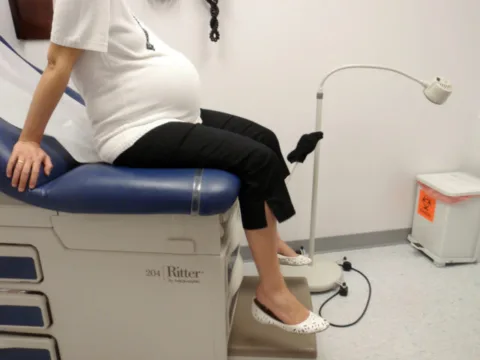If you are newly pregnant or have a few weeks left to go, you may already be learning — like I did — that pregnancy is not always a wonderful feeling and beautiful thing.
Your body is going through countless changes and I can attest to the fact that many of those changes are downright awful.
I’ve compiled a list of things about pregnancy that just are plain gross and may even make you feel like you’re losing your mind…
Pregnancy Doesn’t Get Any More Real Than This!
#1 – Nausea and morning sickness
It can come and go at any time during pregnancy, leaving you feeling like a limp noodle.
For the vast majority of expectant moms, the worst of it is over between weeks 12 to 14 (though a few women continue to experience symptoms into the second trimester, and a very few, particularly those expecting multiples, may suffer some well into the third). Even better news: Though morning sickness might make you feel lousy, it’s not harming your baby. Source
My advice: Try to avoid having an empty stomach. And remember that crackers and water are your friend.
Here are 7 natural cures for morning sickness.
#2 – Loss of bladder control
It often occurs the further you progress in pregnancy. The leaking is due to pressure of the growing uterus on the bladder.
In a recent study of pregnant women, researchers found that 62% had incontinence during the pregnancy. And 50% continued to have problems with leaking urine after childbirth. Women who didn’t have problems with incontinence during pregnancy had a lower risk of postpartum incontinence compared to women who experienced incontinence at any point during their pregnancy. Source
My advice: Keep an extra pair of panties (or two!) on you at all times. Sneezing and coughing are 2 actions that you’ll try to avoid with a vengeance in order to prevent leaking urine.
#3 – Fatigue
It can hit at any time and leave you feeling constantly drained.
Although experience with fatigue tends to vary, most women will feel more tired than usual during their pregnancy. Fatigue during pregnancy is most common during the first trimester. It tends to go away during the second trimester, but will usually return in the third trimester. Source
My advice: Get your iron levels checked, eat healthy, and get lots of rest to minimize the effects of fatigue throughout your pregnancy.
Here are 14 ways to deal with pregnancy fatigue.
#4 – Acne
It’s the complete opposite of the smooth and glowing skin you expected. Pregnancy acne can leave you looking like a teen who’s going through puberty.
It’s thought that pregnancy hormones might increase the skin’s production of oil. The oil builds up and clogs the pores, attracts bacteria and causes those nasty bumps. Source
My advice: Don’t use over-the-counter acne medications — because some of the ingredients can lead to birth defects and pregnancy complications.
Here are 6 all-natural pregnancy acne remedies.
#5 – A heightened sense of smell
It may cause you to avoid the people and places you love. It can happen at any time. And the increased sensitivity to odors may overstimulate your nausea triggers.
Blood flow in your body increases by up to 50% in pregnancy, so anything moving from your blood to your brain reaches it faster and in larger quantities. This heightens your responses, and some experts think that’s why you react more strongly to smells. Your olfactory centers — the receptors that pick up smells — may also be affected by this increased flow. Source
My advice: Try to surround yourself with scents that actually make you feel better — like mint, lemon, ginger — which tend to alleviate nausea, rather than make it worse.
Here are 6 things you can do to avoid feeling nauseated around certain smells.
#6 – Pregnancy bloat
It occurs as your digestion starts slowing down during pregnancy – to give the nutrients from food you eat more time to enter your bloodstream and reach your growing baby. Slower digestion causes bloating.
You can blame these not-so-fun pregnancy symptoms largely on the hormones your body is producing – specifically all the estrogen and progesterone. Your body’s making more of both now to relax smooth muscle tissue. Unfortunately, this causes your gastrointestinal tract to relax a little too much, leading to side effects like bloating, indigestion, constipation, stomachaches and, yes, all that horrific gas you’ve been having lately. Source
My advice: Drink lots of water and avoid caffeinated drinks.
Here are 15 remedies for pregnancy bloat.
#7 – Excessive sweating
It often happens during the night, but it can happen round the clock – no matter where you are. Sweating can stain your clothes and cause you to smell unappealing.
The hormonal shifts that occur when sperm meets egg confuse the hypothalamus (the area of the brain that helps regulate body temperature), making it perceive heat even if it’s a balmy 70°F (and you’re in the shade). This, in turn, triggers your body’s sweating reflex –designed to cool you down when the temperature actually is heating up. Source
My advice: Take cooler showers and use talc-free powder to avoid moisture. You could also switch to a more effective antiperspirant/deodorant.
Here are 7 tips for dealing with excessive sweating during pregnancy.
#8 – Stretch marks
They can show up anywhere. Once they appear, they never really go away.
Stretch marks are actually tiny tears in the supporting layers of tissue under your skin as it’s pulled tight to the limit during pregnancy. Susceptibility has lots to do with genetics. Chances are, if your mother got them, you probably will too – while if she sailed through her pregnancies with smooth skin intact, you’ll probably stay as smooth as your baby’s butt. Rapid pregnancy weight gain can also make you more likely to get stretch marks. And darker-skinned women are less likely to get stretch marks as fair-skinned gals. Source
My advice: They are a true sign of your pregnancy and should be worn proudly. Fortunately, they will gradually fade over time.
Here are 16 ways to remove stretch marks during pregnancy.
#9 – Spider veins and varicose veins
They can occur on your face, legs, and on other areas of your body — due to increased blood flow and hormones.
What you’re seeing is a vital part of your growing baby’s support system — the network of veins that are carrying your increasing blood supply and nutrients to your fetus (your pregnancy dollars at work!). That’s because your blood volume is up by 20 to 40% during pregnancy (talk about work!) – and your veins are keeping up with the flow. Source
My advice: Your veins will become more noticeable during pregnancy, but there’s not a lot you can do about it. They will go back to normal within about 4 months of your baby being born.
Here are 7 things you can do to prevent varicose veins during pregnancy.
#10 – Melasma (“the Mask of Pregnancy”)
It consists of dark splotches on your skin that can occur anywhere on your face.
You’re likely to notice the brownish spots on your forehead, cheeks and upper lip. Pigmentation levels, sent soaring by your changing hormones, are to blame for this discoloration. Source
My advice: Minimize sun exposure to avoid exacerbating the dark spots. It will go away a few months after you’ve given birth. You should also use mild soaps and cleansers that are oil-free and fragrance-free — because they’re less likely to contain chemicals that react negatively with the sun.
Here are 3 things you can do to prevent skin discoloration during pregnancy.
#11 – Nose spread
Since nasal cartilage becomes softer during pregnancy due to an increase in hormones, your nose may to get wider from the increase in blood flow. This is especially true if you’re having a baby girl.
Rhinitis of pregnancy, or a widening of the nose in the second and third trimester, is caused by higher estrogen levels. The estrogen encourages fluid retention and a thickening of mucus linings in the nasal passages and sinuses. This can sometimes produce the outward appearance of a wider nose. Source
My advice: Don’t worry. Once your baby is born, your nose will go back to its normal shape. It usually takes a month or two.
Here’s what you can do to alleviate the nasal congestion that often accompanies pregnancy nose spread.
#12 – Excessive hair growth
You’re likely to notice hair on places other than your head — like the face, belly or around the nipples. Hair on your forearms and upper lip may also appear thicker and darker. This is due to an increase in hormones.
Hairs on our body are usually in one of two phases – either growing and then falling out, or resting. At any time about 90% of our hair is growing and only 10% resting. During pregnancy, however, increased hormone levels push more hairs into the resting phase. This means fewer hairs are falling out and so you appear to have thicker hair. This excess hair is usually welcome on a woman’s head but it can be more alarming when there appears to be an increase in the hairs on the body too. Source
My advice: Try plucking, shaving, or waxing the hair that appears on places of your body that you previously never considered shaving or waxing before. Or just wait until about 6 months — at which point most of the excess hair should have completely fallen out. By the way, peach fuzz is more likely to go away than coarse, deep-rooted hairs are.
Here are the safest ways to remove hair during pregnancy.
#13 – Skin tags and moles
Skin tags are extra pieces of skin that can pop up anywhere. And moles that you had before pregnancy may get bigger during your pregnancy.
Skin tags are tiny pieces of hanging skin that develop in folds or in areas where skin rubs against skin or clothing. They typically appear along the eyelids, neck, underarms, under the breasts and in the groin. Skin tags are completely harmless. Source
My advice: No one will notice them but you.
After giving birth, if you find that you have more moles and skin tags than you’re comfortable with, you can have them removed by a dermatologist.
#14 – Raging hormones
They can make you feel like you’re not yourself. You may be overly emotional, irrational, and even seem out of control at times.
It is common for you to experience raging emotions in pregnancy. The surge of hormones in your body can make you more emotional, moody, and irritable. It may feel like you’re on a roller coaster ride of feelings and emotions. Some women find that a song on the radio or a TV commercial causes them to break into sobs. Other women may cry uncontrollable and then giggle only minutes later. Source
My advice: Be open and honest with anyone who will listen. Communication is the key to feeling understood and accepted at all times – not just during pregnancy.
Here are 10 ways to tame raging hormones during pregnancy.
#15 – Gingivitis and swollen gums
These can make the inside of your mouth feel tender and sore. You may not feel like eating certain foods or brushing your teeth.
About half of moms-to-be have swollen, red, tender gums that bleed when flossed or brushed. The cause is a mild form of gum disease known as pregnancy gingivitis. Your gums are more likely to become inflamed during pregnancy in part because of hormonal changes that make them more sensitive to the bacteria in plaque. You may also develop a benign nodule on your gums that bleeds when you brush. This relatively rare nodule is called a pregnancy tumor or pyogenic granuloma – scary names for something that’s harmless and usually painless. Source
My advice: Continue to brush and floss your teeth, just be sure to use a soft toothbrush (instead of a medium or hard one).
Here are some things you can do to manage swollen gums during pregnancy.
Believe it or not, I experienced 13 of the 15 pregnancy symptoms listed above.
They were not fun, and they certainly did not make me feel beautiful. In fact, they made me feel unattractive — which is something you may or may not feel as your belly grows larger.
My advice is if you experience any of these symptoms, relax and remember that the majority of them are not permanent. They will eventually pass, and you’ll go on to regain control of your body again after you give birth.
In the meantime, enjoy every moment of your pregnancy (yes, even the unpleasant moments) because everything is worth the big reward you get in the end — your baby.
Even More Scary Facts About Pregnancy
- Stuff Nobody Tells You About Labor & Post-Delivery
- All About Discharge And Bleeding After Giving Birth
- Top 5 Pregnancy Fears
- New Moms Tell What Pregnancy Is Really Like
- Things Your Mother Never Told You About Pregnancy
I’m a stay-at-home mom and writer. Having experienced the joys and discomforts of pregnancy 3 times, I have a lot of advice to offer expecting mothers. I’m committed to providing new moms with an in-depth and honest view on pregnancy, so you’ll have a better idea of what to expect and a good feel for what pregnancy is really like.





